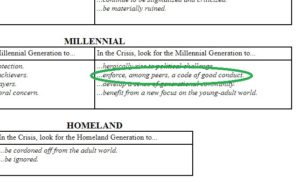Millennials as Consensus-builders on Social Media
 I recently posted a list of patterns to look for among the living generations in the current social era, based on Strauss & Howe generational theory. I wanted to take a closer look at some of the items on that list in a series of posts, and I’ll start with one under that most talked about of generations – the Millennials.
I recently posted a list of patterns to look for among the living generations in the current social era, based on Strauss & Howe generational theory. I wanted to take a closer look at some of the items on that list in a series of posts, and I’ll start with one under that most talked about of generations – the Millennials.
The item in particular is the second one in the Crisis era box – “look for the Millennial generation to enforce, among peers, a code of good conduct.” You can see this happening in that ubiquitous phenomenon that is defining the times – social media.
The rise of social media is part of the story of the maturation of the Internet, which first came into the public eye at a time when computer networks were the province of a small minority of socially outcast nerds. As adoption grew through the “you’ve got mail” era and into the dawn of today’s tech giants like Amazon and Google, going online became more and more mainstream.
Then, just around the start of the Crisis in 2008, came a new kind of computer that made being online essentially effortless – the smartphone. With it came an explosion of participation on Internet sites designed to promote social networking and interaction. Now, ten years later, what we call social media platforms dominate as a source of information and news.
The term “media” refers to an era’s primary means of mass communication. Adding the qualifier “social” suggests that a socializing role has been added to that of communicating, and perhaps that control of mass communication has been transferred from media elites (who are now mistrusted) to society at large.
The socializing role is evident in the familiar features of promoting posts (“liking” and “sharing”). Popular opinions rise to the top of feeds and are seen by the most viewers. Unpopular opinions are quashed. The consensus is reinforced through the use of signal-boosting hashtags like #metoo.
Another form of enforcement involves calling out bad behavior. A post demonstrates a transgression of social mores, which may, unfortunately for the transgressor, be taken out of context. Then a blast of comments shames the person. In extreme cases, the person may be identified in real life – called “doxxing” – which can be ruinous.
Perhaps the exemplary case in point is the store owner who posts an anti-gay sign, and then finds his or her business boycotted after a picture of the sign goes viral on social media. But how far might the phenomenon go? Blogger John Robb speculates about “weaponized social networks” and imagines their full potenital.
As for the people being in charge of mass communication now, the “democratization of the media” if you will – that has proven fraught with challenges. Social networks are vulnerable to infiltration, and social engineering has swayed elections. Social media sharing makes the dissemination of false information much too easy, and so the term “fake news” has come into the zeitgeist.
There is also the question of whose consensus is being enforced, as there are competing “red-state” and “blue-state” networks, each attempting to persuade us with their values-promoting memes. What values prevail will be evident in time. And though all of the living generations are participating in this social evolution, ultimately it will be the rising Millennial generation that defines what conduct is considered correct.
3 thoughts on “Millennials as Consensus-builders on Social Media”